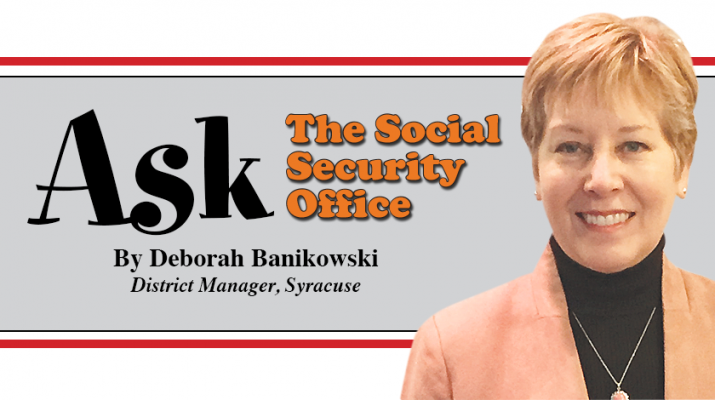By Deborah Banikowski
District Manager, Syracuse
In March 2020, we temporarily closed all of our Social Security Hearing Offices due to the coronavirus pandemic and are not offering in-person hearings. During the office closures, we are providing two flexible, safe and secure hearing options: either a telephone hearing or our new option of an online video hearing.
Additional information on both of these hearing options is available here: www.ssa.gov/appeals/hearing_options.html
What are “online video hearings”?
Online video hearings are a secure way to conduct hearings over the internet, using a free platform called Microsoft Teams. You and your representative, if you have one, can attend the online video hearing safely and securely from any private place with a secure internet connection using a camera-enabled smartphone, tablet or computer.
Like our telephone hearings option, the online video hearings option is not mandatory. We will conduct online video hearings the same way we conduct telephone and in-person hearings. During the hearing, the administrative law judge (ALJ) will swear in all hearing participants and listen to your testimony. You will see the ALJ and representative, if one has been appointed. Other participants, such as vocational or medical experts and interpreters, will join by phone.
What are the technology requirements to participate in an online video hearing?
You and an appointed representative, if applicable, must have access to email and a personal computer, laptop, Android or Apple tablet or mobile device with a secure and private, high-speed Wi-Fi or cellular data connection. The device must have a camera, microphone, and speakers. If using a mobile device, you must download the free Microsoft Teams application.
We will send you a link to a user guide that explains how to access and use Microsoft Teams before the date of an online video hearing.
Please read our publication Online Video Hearings at the Social Security Administration at www.ssa.gov/pubs/EN-70-10284.pdf for additional information. A short video about online video hearings is available at www.ssa.gov/appeals/hearing_video.html.
Q&A
Q: I worked for the last 10 years and I now have my 40 credits. Does this mean that I get the maximum Social Security retirement benefit?
A: Probably not. The 40 credits are the minimum number you need to qualify for retirement benefits. However, we do not base your benefit amount on those credits; it’s based on your earnings over a lifetime of work. To learn more about how you earn Social Security credits and how they work, read or listen to our publication How You Earn Credits, available at www.socialsecurity.gov/pubs.
Q: I’m expecting a baby this June. What do I need to do to get a Social Security number for my baby?
A: Apply for a number at the hospital when you apply for your baby’s birth certificate. The state agency that issues birth certificates will share your child’s information with us and we will mail the Social Security card to you. You can learn more about the Social Security number and card by reading our online publication “Social Security Numbers for Children”, available at www.socialsecurity.gov/pubs.
Q: Someone stole my Social Security number, and it’s being used repeatedly. Does Social Security issue new Social Security numbers to victims of repeated identity theft?
A: Identity theft is one of the fastest growing crimes in America, so you aren’t alone. If you’ve done all you can to identify and fix the problem, including contacting the Federal Trade Commission (FTC), but someone is still using your number, Social Security may assign you a new number. If you decide to apply for a new number, you’ll need to prove your identity, age, and U.S. citizenship or immigration status. You’ll also need to provide evidence you’re having ongoing problems because of the misuse of your current Social Security number. You can read more about identity theft at www.socialsecurity.gov/pubs.
Q: What is the earliest age I can begin receiving Social Security retirement benefits?
A: The earliest age you can begin receiving Social Security retirement benefits is age 62. If you decide to receive benefits before your full retirement age, which for most people is age 66 or 67, you will receive a reduced benefit. Keep in mind you will not be able to receive Medicare coverage until age 65, even if you decide to retire at an earlier age. For more information, go to www.socialsecurity.gov/retire.

